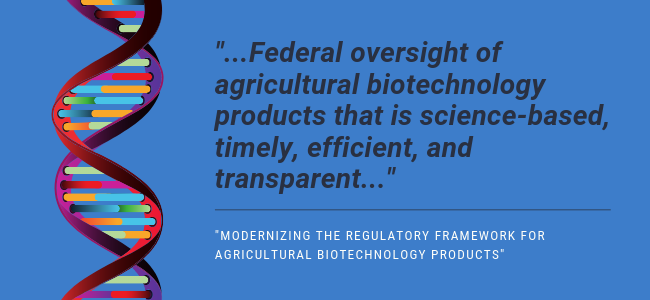A new executive order from President Donald J. Trump supports science-based regulation of agricultural biotechnology products and lends support to the work of the U.S. Grains Council (USGC) and other cooperators to encourage a similar approach in global markets.
“Despite the unlevel global regulatory playing field, innovation in the agriculture sector is advancing rapidly,” said Allison Nepveux, USGC manager of trade policy. “These advances create unprecedented opportunities for rural economic growth, but governing policies must address potential barriers to trade in a real and lasting way and build a model for regulatory cooperation.”
The executive order, issued on June 11 and titled “Modernizing the Regulatory Framework for Agricultural Biotechnology Products,” directs the U.S. Food and Drug Administration (FDA), the U.S. Department of Agriculture (USDA) and the U.S. Environmental Protection Agency (EPA) to review their respective agricultural biotechnology regulatory systems to streamline processes and remove overly burdensome regulations. The order codifies existing work taking place at the three agencies and provides a 180-day timeline for the agencies to do so.
The executive order also furthers policies important to farmers by expanding markets and urging USDA, the U.S. Trade Representative (USTR) and the Department of State to work with trading partners to synchronize approval processes internationally and help remove barriers to trade created by non-transparent and non-science-based regulatory approval processes.
The Council is using funding from the USDA’s Agricultural Trade Promotion (ATP) program to address potential barriers to trade in key export markets, including regulatory burdens, lack of harmonization and political interference in regulatory decision-making. The Council’s ATP projects are two of four total projects undertaken by a myriad of cooperators to encourage markets to move forward with policies that are appropriate and science-based, lest regulatory regimes inhibit commercialization of innovative agricultural technologies.
“Addressing both current and potential non-tariff barriers is critical to ensuring the economic health of America’s farmers and incentivizing technology firms to invest in research and development that will protect the long-term global competitiveness of U.S agriculture,” Nepveux said.
About The U.S. Grains Council
The U.S. Grains Council develops export markets for U.S. barley, corn, sorghum and related products including distiller’s dried grains with solubles (DDGS) and ethanol. With full-time presence in 28 locations, the Council operates programs in more than 50 countries and the European Union. The Council believes exports are vital to global economic development and to U.S. agriculture’s profitability. Detailed information about the Council and its programs is online at www.grains.org.

